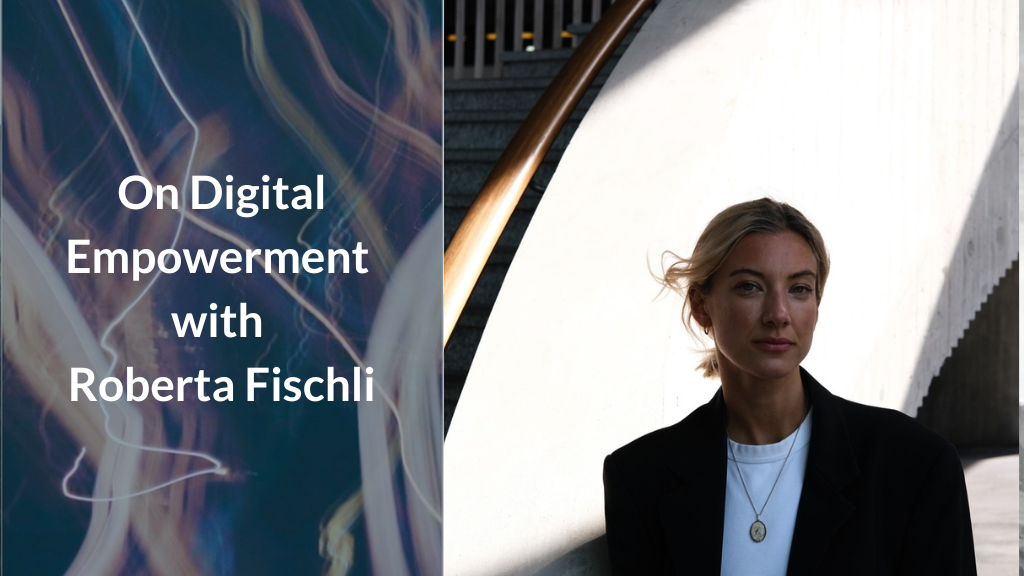On Digital Empowerment with Roberta Fischli
Sophie Känzig • November 2022

The way we do business today is not the way we must do business tomorrow. Especially not in the digital economy where extracting data and using it for profit is a lucrative and fairly standard business model. Political scientist and digital activist Roberta Fischli reminds us that we have the power to change the status quo – and shines a light on the people and initiatives that already do that. In her work at the intersection of political economy, legal theory, and political theory, she focuses on the new challenges brought by digital technology – and how society can leverage it for the common good.
Roberta Fischli is a PhD Candidate at the University of St. Gallen and, at the time of our interview, a researcher at the Center for the Study of Law and Society at UC Berkeley. In her recent publication, Data-owning democracy: Citizen empowerment through data ownership, she invites us to think about the digital economy in a different way: to shift the conversation from protecting people from the potential harms of data exploitation towards a digital ecosystem that benefits as many people as possible.
Please give us some background. What is your paper about?
Today we often speak about data exploitation in areas that aren’t beneficial to us as a society. Many of us have a pretty good idea about the things we would like to see changed online – algorithmic bias, discrimination, exploitation. But while knowing what is currently going wrong in the digital economy is undoubtedly important, we don’t devote equal attention to exploring how we could leverage the positive potential of data for us as a society – and I think it is time we change that.
With my paper Data-owning democracy: Citizen empowerment through data ownership, I invite us to shift our focus from “protection” to “empowerment”. Data is among the most valuable resources that exist and it seems to me that we as a society have given up on the idea of claiming ownership over it. Instead, most of us are now busy drafting legislation or initiatives that protect people from the harms of digital technologies. Don’t get me wrong – it is imperative that we keep doing this. But if data is indeed a transformative resource all the marketing guys obsess over, why can’t we figure out how to use it for the common good?
In your paper, you explore how we can ensure that current data commodification processes benefit as many people as possible. So how can we do that? Are initiatives like that already in place?
As a society, we currently have little way to proactively steer the direction of the digital economy. Individually and collectively, we are confined to the role of the ‘consumer’ who takes what is given to them, be that a digital service or infrastructure. Corporations, however, have mastered the game. They make sure we produce data about ourselves, which they subsequently analyze, sell, and exploit. It doesn’t have to be this way. In my paper, I draw inspiration from Project Decode, a pilot project introduced by the City of Barcelona that ran between 2017-2019. Project Decode was an impressive attempt to make the city of Barcelona ‘smart’, without giving away data sovereignty to corporations. For two years, the people of Barcelona collected various data about public life – such as traffic or noise pollution – and were able to decide with whom this data is shared, how, and for what purpose. Companies that wanted to take part in this ecosystem were legally mandated to return the generated data to the city so that Barcelona’s citizens could decide what to do with it.
This project illustrated beautifully that there is a middle ground between the reigning and exploitative digital ecosystem and its polar opposite: completely banning all collection and use of data. I am interested in this middle ground. How can we ensure that digital technologies benefit as many people as possible?
You talk about how our human experiences such as information about our habits, emotions, or deepest fears are the newest addition to the data pool. How is using information like that different in the digital world?
Knowledge about your emotions and state of mind makes you extremely vulnerable to exploitation. A company’s job is to generate profit, not to care about you and your feelings. In our data-driven age, access to that kind of information becomes a lucrative opportunity – corporations can use it to provide us with advertisements for beauty products precisely at the time when we are feeling particularly vulnerable, for example. From a business perspective, this is excellent news – from an ethical standpoint, not so much. If you wouldn’t want your neighbours to know these things, you certainly don’t want companies to know them.
What does the internet you wish for look like?
I want the internet to be safe. I want people to voice their opinions without fear of economic and political exploitation; I want an internet that empowers communities and allows for real conversations, also the hard ones. But today, attention and anger mean clicks – and therefore – profit. But what if we started using the data that is being generated to enable people, instead of reducing them to the role of the consumer? What if we use public data to learn where bicycle lanes should be built, how traffic can be regulated, and what neighbourhoods should get more parks? I’d like to encourage us to fight for privacy and against exploitation. But I also want to move the conversation beyond the dangers of technology. As important as those questions are; there are others we stopped asking some time ago: What does our digital utopia look like? And how can we get there?
More about Roberta Fischli and her work can be found here:
Twitter: twitter.com/leonieclaude
Mastodon: leonieclaude.mastodon.social
Website: robertafischli.com